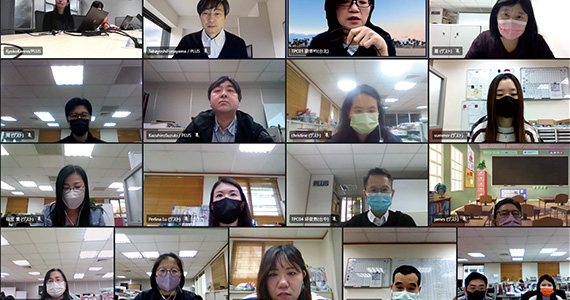Sustainability Management
Organizational Structure for Sustainability of The PLUS Group
The Sustainability activities of The PLUS Group are carried out under the supervision of the Group Management Meeting, Meeting of Board Directors, and the Corporate Council to work on issues in cooperation with the Sustainability Office of the corporate headquarters and the Risk Management Promotion Committee of PLUS CORPORATION.
At overseas bases, the Compliance Committee and the Sustainability Office hold seminars on compliance, Sustainability, and SDGs for local employees using the online meeting system, to promote awareness of concepts and direction of the Group’s Sustainability throughout the Group as well as issues to be addressed in the future by exchanging and sharing information.

Promoting sustainability through internal education and employee research
The PLUS Group is striving to spread Sustainability throughout the entire group through education and training related to Sustainability. We have created our own educational materials utilizing international standards such as ISO26000 to ensure that each and every employee of The PLUS Group understands the expectations of our stakeholders and the role we are expected to play, and to promote Sustainability activities as a leader of the Group.
In 2023, we held the following seminars online. We conduct sustainability seminars via teleconferences to Group companies inside and outside Japan.
- Sustainability seminars
Themes: PLUS Group sustainability policies and materialities - Sustainability procurement seminars
Themes: PLUS Group Procurement Policy and Guideline
As group training, we hosted the “2030 SDGs” card game as part of our follow-up training for second-year employees. Through this game, employees thought about “Why does our world need SDGs?” and “What kinds of changes or possibilities would SDGs create?”
In order to ascertain the effects of this education and training, we started conducting a sustainability awareness survey for all employees in 2023. The results of the survey revealed that 92% of employees are interested in sustainability.

Follow-up training

Online training for Group companies outside Japan
The Materiality Identification and Management Process
To ensure comprehensiveness, objectivity, and uniqueness, we identified materiality using the following three steps in 2022. Materiality is reviewed and discussed annually in accordance with the three-year Medium-term Business Plan, taking into account such matters as changes in the importance of issues and the emergence of new issues and is revised as necessary.
STEP1Select social issues
We started by considering 205 social issues
When discussing materiality, we first selected a wide range of sustainability issues on the basis of international initiatives, industry policies, and stakeholder surveys. We created a list of 205 issues. Furthermore, we added information about the company, such as the medium-term management plan, employee satisfaction surveys, and top messages sent internally and externally, to the 205 issues and made a selection.
Reference materials used when selecting issues
- Initiatives referenced: ISO26000, OECD Guidelines for Multinational Enterprises, SDGs, etc.
- Industry policies referenced: All Japan Stationery Association, Japan Office Institutional Furniture Association
- Stakeholder surveys: Survey items from customer companies, employee engagement surveys

STEP2Rank in priority for The PLUS Group
We discussed which were issues where The PLUS Group could make a contribution
We created a working Group that cuts across our four business companies and nine Group companies (as of 2021), and held several workshops. From among the issues listed, ones that are particularly relevant to the business of The PLUS Group were selected, and each issue was organized into “aggressive” (issues that lead to business opportunities for the company) and “defensive” (issues that might lead to risks for the company). These were quantitatively evaluated and weighted on the two axes of “importance to The PLUS Group” and “importance to stakeholders.”
In addition, based on the degree of relevance to the business strategies of each company and our vision of their future, we discussed important issues while taking into consideration such questions as, “To which issues can we contribute in a more typically PLUS Group way?” and “Which issues will lead to future growth?”

STEP3Management approval
Materiality approved by the Board of Directors
Top management, including the chairman and the president, reviewed the shortlist of important issues (materialities) that had been narrowed down via the above process. The final draft was compiled based on management intentions and was approved by the Board of Directors.